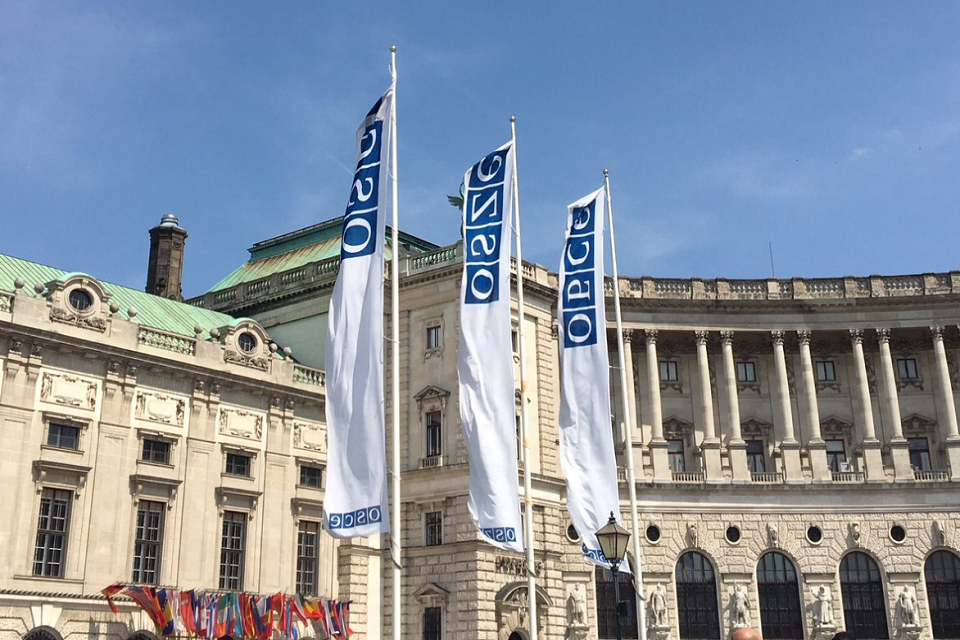Every child in Ukraine will have suffered due to Russia’s invasion: UK statement to the OSCE
Ambassador Neil Bush highlights the appalling and long-lasting impact Russia’s invasion has on Ukraine’s children.

Thank you Mr. Chair. As we gathered in this Council last week, Russia had just launched its latest wave of mass long-range attacks across Ukraine. The tenth such wave since October 2022. Local officials reported at least 11 people killed.
Just three days later, Russia shelled residential areas in Kherson. According to local authorities, Russian attacks hit a bus station, post office, bank and residential buildings. These buildings are the fabric of everyday life, yet ordinary Ukrainians are risking their lives to access basic services that we take for granted. In these attacks alone, three people were killed, and ten injured. On the same day, a Russian missile hit an apartment building in Kharkiv. An elderly woman’s body was pulled from the rubble. Three others were injured. And once again, as we meet today, we hear reports of a missile strike on a civilian building in Kramatorsk, killing three and injuring eighteen. This vicious cycle has to stop.
Mr Chair, I wish to focus my statement today on the appalling and long-lasting impact of Russia’s invasion on Ukraine’s children.
It is not possible to confirm the exact number of children that have been direct casualties. But the Office of the UN High Commissioner for Human Rights (OHCHR) has verified that, as of last month, Russia’s invasion has killed more than 400 children, and injured over 800. The true toll is likely to be significantly higher. These numbers document only some impacts of Russia’s invasion. They do not account for the childhoods that have been stolen – including children who have endured sexual violence and other abuse. Or the children that have lost family members too soon. Or the devastating and long-term impact on the mental health of this younger generation.
Every child in Ukraine will have suffered because of Russia’s invasion. Hundreds of thousands of children have been forced from Ukraine. Either fleeing to other countries of safety, or through reported forced deportation and abduction by Russian armed forces - sometimes without their parents’ knowledge. According to the United Nations High Commissioner for Refugees, Filippo Grandi, Russia is violating fundamental child protection principles by giving Russian passports to unaccompanied child refugees. We are deeply worried by these reports.
Indiscriminate Russian attacks have destroyed countless schools and disrupted education, denying children vital structure and risking life-long consequences on learning. At the same time, many parents and caregivers are reluctant to send children to school due to safety concerns. Frequent power cuts prevent online learning. In temporarily Russian-controlled areas, the Russia-imposed school curriculum propagates disinformation and teachers are punished for teaching in Ukrainian.
And as we know all too well, children suffer disproportionately from lack of power, heating, and water caused by Russian attacks. Families have been forced to use candles, gas burners and generators to have light and to keep their children warm. In the middle of winter. Their struggle is the result of one man’s choosing.
Mr Chair, as we speak, a Russian court is considering the appeals of four Crimean Tatars who were arrested on politically motivated charges. We stand in solidarity with Seytumer and Osman Seytumerov, Amet Suleymanov and Rustem Seytmemetov. Russia must cease this treatment immediately and release all those wrongfully detained.
The Ukrainian people have paid, and continue to pay, an unconscionably high price for their freedom and for their future. We are determined to help Ukraine to bring a swift end to this heinous war – to end the suffering of so many. And we will support Ukraine to ensure that Russia’s egregious human rights abuses and violations will not go unpunished and that the perpetrators of war crimes face justice. We will not stop until Ukraine prevails.